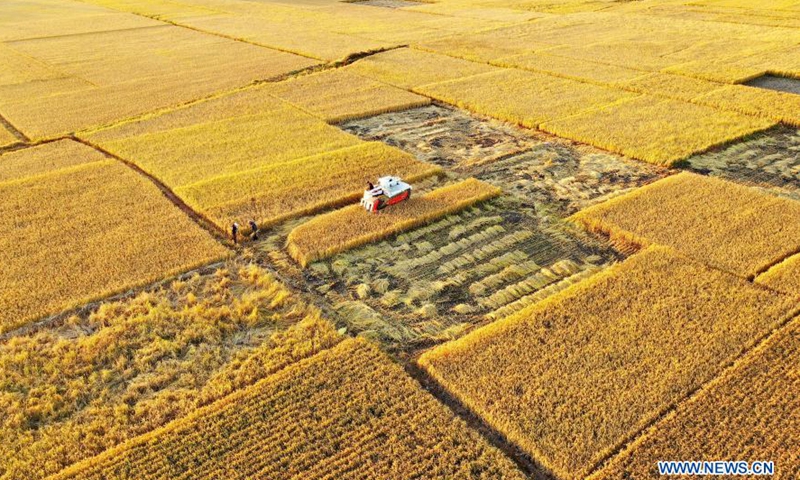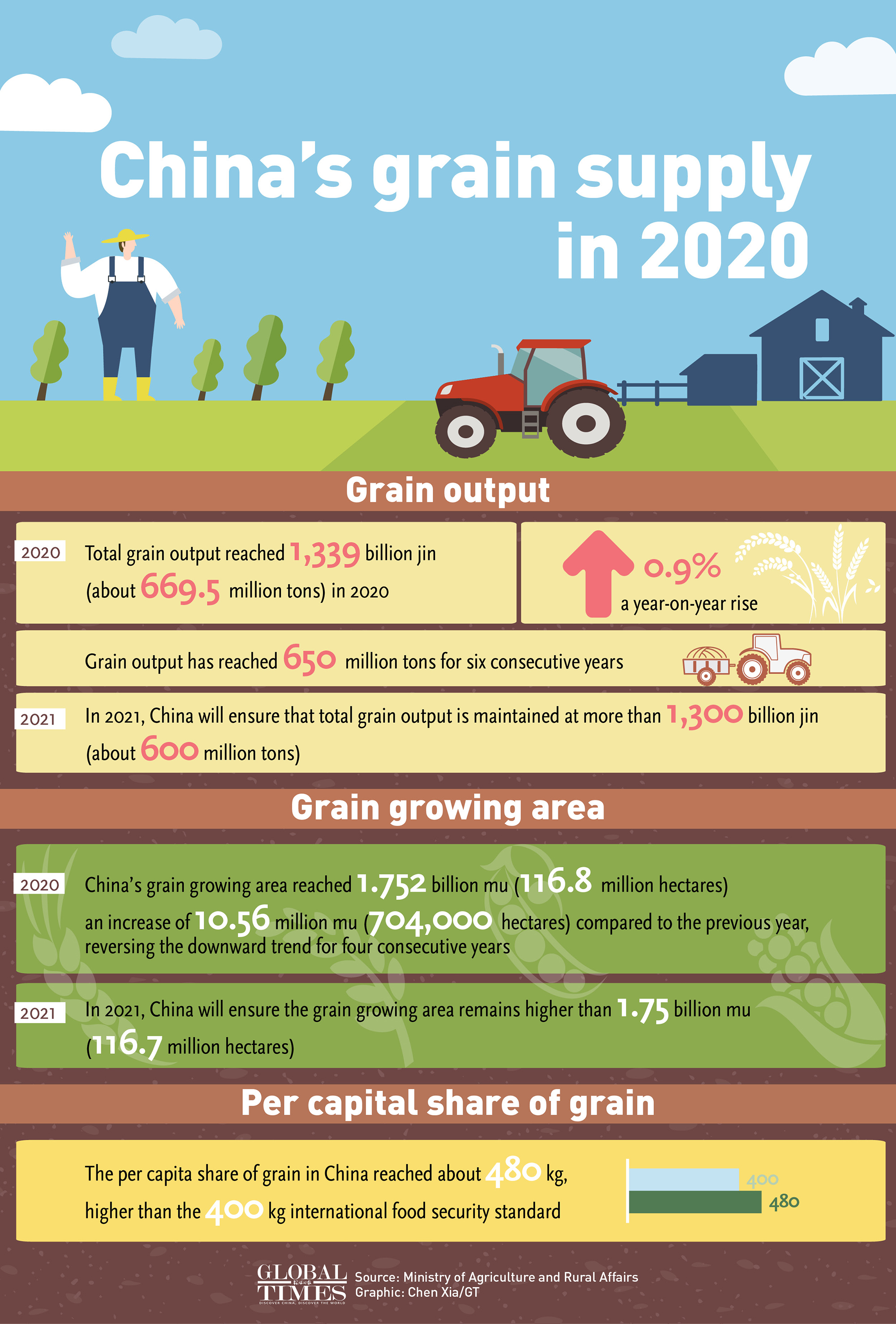China’s staple-food supply sufficient, seed issues still severe: analyst
By Shen Weiduo Source: Global Times Published: 2020/12/24 21:23:39
Seed technology falls far behind, key to ensuring security

Aerial photo taken on Oct. 18, 2020 shows harvesters operating in rice fields at Jiangzhuang Village of Luanzhou City in north China's Hebei Province. China's grain output reached nearly 670 billion kg in 2020, up 5.65 billion kg, or 0.9 percent, from last year, the National Bureau of Statistics (NBS) said on Thursday. This marks the sixth consecutive year that the country's total grain production has exceeded 650 billion kg. The bumper harvest comes despite disrupted farming as a result of the COVID-19 epidemic, which has been held in check thanks to efforts to ensure the transportation of agricultural materials and strengthen farming management.Photo:Xinhua
China's agriculture ministry again stressed the importance of ensuring food security on Thursday, vowing to make ensuring grain production a top priority and a major political task in the next year.The remarks were made during a press conference in Beijing, where officials from the Ministry of Agriculture and Rural Affairs (MARA) explained the food supply situation during the upcoming New Year's Day and China's Spring Festival, noting that the supply of staple foods is both sufficient and rich in variety.
During the holidays, the total supply of key foods will be sufficient - urban and rural residents will not face a shortfall of food or edible oil, nor will they lack meat and vegetables, Tang Ke, director general of MARA's Department of Market and Informatization, told the press conference.
Prices of agricultural products will generally see a rising trend due to seasonal fluctuations and festival factors, but sharp increases are unlikely, Tang said.
Overall, China's grain sector will have another bumper harvest this year, while rice and wheat stocks will be at record highs, hog production has recovered well, and the output of poultry, fruits and vegetables is stable. The domestic agriculture market is expected to remain stable next year, according to the ministry.
China's grain harvest remained at a stable and high level this year, totaling 669.5 million tons, a year-on-year rise of 0.9 percent. In this category, cereal output - including rice, wheat, corn, barley, sorghum, buckwheat and oats - reached 616.74 million tons, up 0.5 percent, according to data released by the National Bureau of Statistics on December 10.

China's grain supply in 2020 Illustration: Chen Xia/GT
China's top policymakers have talked about the importance of food security issues at different occasions. In the just concluded tone-setting Central Economic Work Conference, China vowed to solve issues related to seeds and arable land, and it designated ensuring grain safety as one of the eight priorities in the country's economic work next year.
China needs to enhance the protection of seed quality resources and utilization, and enhance the construction of seed banks, the meeting said, explaining that China should improve technical research into seed sources, which is "also a bottleneck."
"The central government's special emphasis on national food security does not mean China has a 'food crisis,' but is a result of the unstable external political environment, making self-sufficiency and technology independence increasing important," Jiao Shanwei, editor-in-chief of cngrain.com, a website specializing in grain news, told the Global Times on Thursday.
In terms of key technology in the sector, such as seed cultivation for some commercial crops and vegetables, China still lags far behind major industry players such as Monsanto, which was later purchased by Bayer, and American Vanguard Corp, which could pose potential risks to China's food security, experts said.
In 2018, China imported more than 72 million kilograms of crop seeds, with an import value of $475 million. Of the total, the value of vegetable seeds reached $228 million and they came from nearly 50 countries and regions, according to an industry report.
Jiao noted that even in the domestic market, seed companies that account for a larger share are those jointly funded by foreign companies, rather than pure local players.
"In the most extreme situation, if China's trade relations with these companies were halted, the most direct result would be a shortage of vegetables and a rise in food prices," Jiao said, while noting that staple food will be rather safe as seeds of these farm products are completely localized.
Some experts said that to make major technology breakthroughs, the central government still has to play a big role, and it will have to increase investment in the country's seed research and development (R&D) industry for a certain period of time.
The annual R&D investment of China's top 50 seed companies is about 1.5 billion yuan ($229 million), which is only close to one-seventh of that of the former American multinational agricultural company Monsanto, according to Liaowang Magazine, which is under the Xinhua News Agency.
Newspaper headline: Staple food supply sufficient: ministry
Posted in: INDUSTRIES,BIZ FOCUS